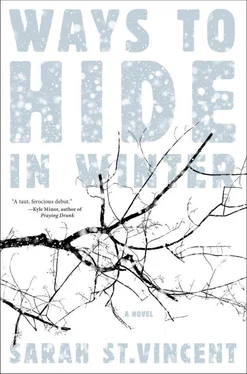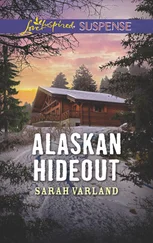Collecting the rubber bands again, I took aim at the stark row of empty days. Smack, smack, smack.
The conversation hadn’t been bad; in fact, I had to admit, it had even been good. Thanks to a fondness for radio news programs, he knew more about what was going on in the outside world than I did; he’d had a lot of time to listen, driving up and down the coast, all the way from Maine to the Florida swamps. “Yep,” he’d said, spearing a piece of meat with his fork, “been all over. It’s true what they say, though—no place like home. That’s why I bought the house.” He chewed and swallowed, his stubble glinting in the candlelight. “Figured it was time to settle down, start making shorter runs, get back to all the stuff I’ve been missing. Sit down at the end of the day in my own chair, in front of my own fireplace. Put down some roots. Being out on the road is great and all, but it gets old.” He’d patted the stomach that hung over his belt, smiling. “You get to an age where you don’t roll along quite so easy anymore.”
“Yeah,” I’d said, knowing it was the right thing to say even though I wasn’t sure exactly what I was agreeing with.
He’d asked me about myself, nodding and letting it drop when I gave short answers. Then we’d moved on to horses: he was thinking about getting a pair, and the people who had previously owned the property had, incredibly, left behind most of their tack, which was still out in the barn. He was thinking about going to school, too, trying out some classes at the community college in Harrisburg, although he didn’t know how keen he was on the idea. Classes were a lot cheaper than a horse, he joked, but at the end of the day, he wasn’t sure which he’d be able to ride farther.
Horses, I thought as I perched on my stool, gazing at the calendar and the mess I was making. When I was a child, my grandfather had once bought a horse, a racehorse that ran on the local track. It was sleek and brown and, no longer young, would give me long, wise looks when I fed it carrots and apples. When my grandmother had found out that that was what my grandfather had done with their savings, she’d refused to speak to him for nearly a month. My grandfather had kept it for a year and then sold it, but it had stayed where it was, running on the same track week after week and standing patiently in the same stall. I had visited it once or twice, and it had continued to look at me serenely, its face noble and untroubled. For all I knew, it was still there, older and stiffer now but still eyeing everything around it with the same expression, its passage from owner to owner momentous to everyone but itself, just pieces of paper changing hands while its life remained precisely the same.
Restlessly, I scooped up the rubber bands and dumped them into a drawer. Then I poured two cups of coffee and went out.
The cups steamed as I climbed the hill, taking pains not to slip in the mud. I must look like some sort of magician, I thought, moving slowly toward the hostel, plumes of white vapor rising from my hands. There was a sound, and I looked up to see the stranger standing in front of the building, his hand still on the door he had just pulled shut. He came toward me.
“I’m so sorry,” he began. “I’ve been thinking about what I said. Somehow I always seem—that is, I really didn’t mean to—”
I thrust a coffee toward him.
“Tell me,” I said, “about Paris.”
The hot drink spilled onto my bare hand, burning the skin, but I pretended not to notice.
“Paris?” he repeated.
“Yes. Tell me about it. What it looks like, what it smells like, what the people do there. I want to know everything.”
He took the cup from my hands, and we stood looking at each other, his eyes seeming to search mine.
“It was a long time ago,” he said at last.
“I don’t care,” I said. “Just humor me. If you don’t mind.”
“You’re not angry about the other thing? Because—”
I waved a hand. “We can talk about the other thing later.”
“Well, all right.” He shivered in the cold. “Where should we go?”
“I don’t know.” I glanced around us. “I could stand to get out of that stupid box for an hour or two. How about the game room?”
“Sure,” he said, and the word had such an unexpected American ring to it that for a moment I had to hide a faint smile. He was a mimic at heart, I thought, even if he wasn’t an especially gifted one.
“We can play chess while we talk,” he was saying. “I can teach you some new openings.”
I was already passing him, climbing the hill, digging my feet into the mud. “Whatever you want,” I replied.
—
That night, for what I had to admit to myself was the first time in weeks, I didn’t take the pills. I’d put more wood in the stove before going to bed, but the house was drafty, and gusts of cold reached me from the window. There was an ice storm coming, the radio had said.
I lay on my back on the mattress, looking up at the ceiling I couldn’t see. Unlike in Carlisle, the darkness out here was absolutely dark, the silence absolutely silent. After a time, I felt as if I were floating, hovering a foot or two above the ground, spinning lightly in the void. I didn’t mind, and sometimes, on nights like this, I even sought out the sensation. My mind would come untethered, voyaging through the unknown, the things only I could see. Most of the time, they were benign, just shapes and colors and fragments of memory. Sometimes, though, they were sharper, words and scenes I preferred to forget. One of the many benefits of the pills was that they took away the odds this would happen by eliminating the game altogether.
Tonight, however, I had decided to play.
The house I’d shared with Amos had nearly always been silent, except during the few hours when he was both home and awake, when the main sounds had been the voices from the TV and our own forks scraping against our plates. His job exhausted him, and over time, I had learned to be careful not to do things that disturbed his peace—so careful, in fact, that when he was in the room I barely stirred. I learned to listen without responding, except for a nod or a sympathetic shake of the head, and to sit on the edges of things. In books, I remembered—especially those for children—characters would sometimes pinch themselves to make sure they were real, that they weren’t dreaming. I would look into mirrors, touch my own face or the corner of a table, reassuring myself of my own solidity. Of course, it wasn’t really as bad as that; I never truly had any doubt that I still existed. It was just that the quiet seemed to press in on me somehow, to wrap me in a layer of something I couldn’t see, slowing my movements, making me wonder whether I’d said things aloud.
I didn’t leave the small set of rooms very often—Amos brought us everything we needed, and anyway we only had one car—but when I did, I found that I was increasingly unsure of what to do or say. A checkout girl would say hello as she swiped my gallon of milk, and I would hesitate before answering. I didn’t want to say the wrong thing, because I had learned that I often said the wrong thing; on the other hand, I didn’t want to seem unfriendly either. I would look down into my purse, smiling shyly, pushing my hair behind my ears as I waited for the transaction to be over. Not long after they opened the Walmart in Carlisle, I overheard a cashier there say she thought I was deaf.
“I’m not surprised,” Amos said when I told him. “Everybody always said you weren’t quite right. That’s what they used to tell me, when I first started seeing you.”
He had looked up from his dinner and smiled, so I wasn’t sure if he was joking, but maybe he wasn’t. Maybe I had always been strange. Or maybe, as he sometimes suggested, I was starting to lose my mind.
Читать дальше












